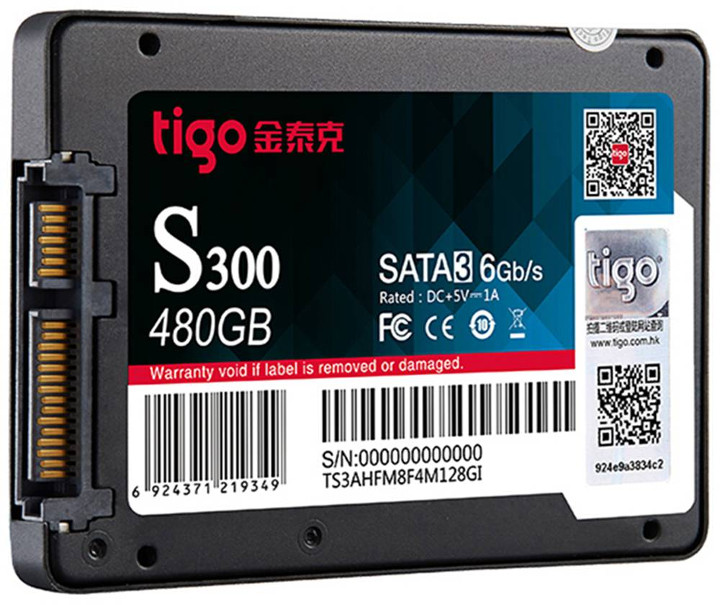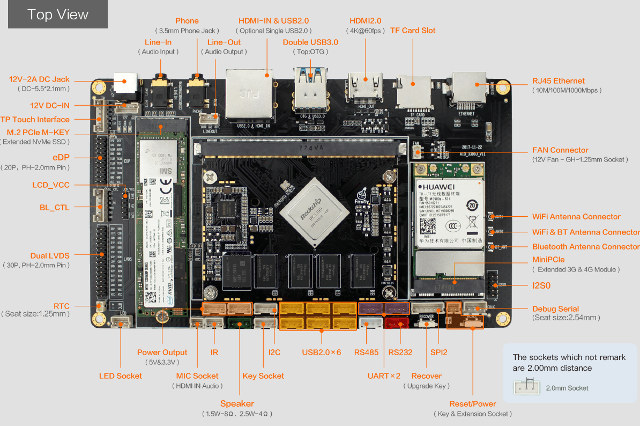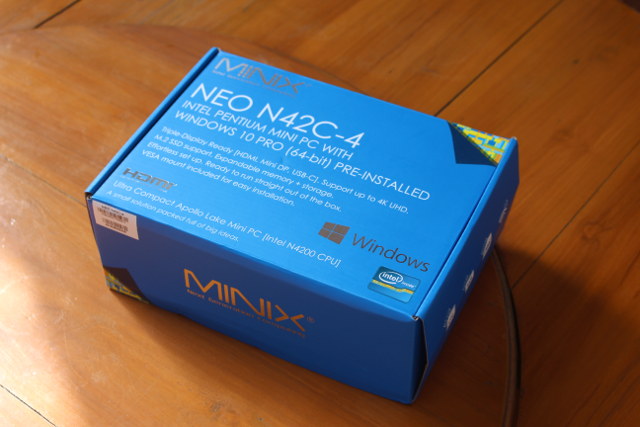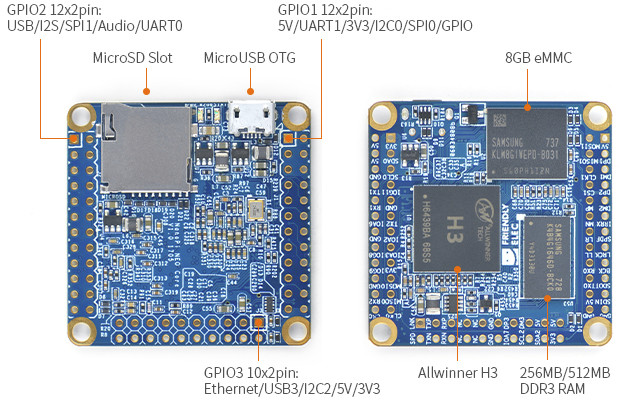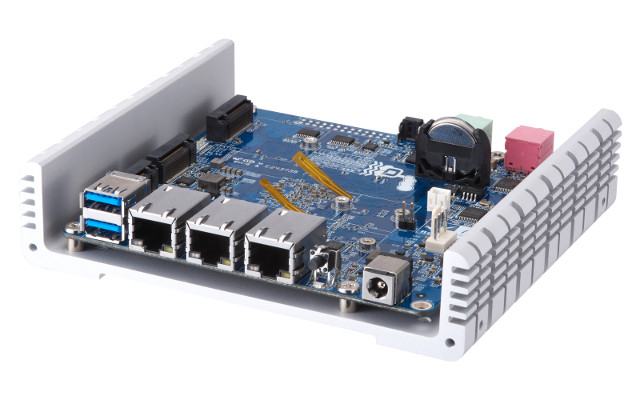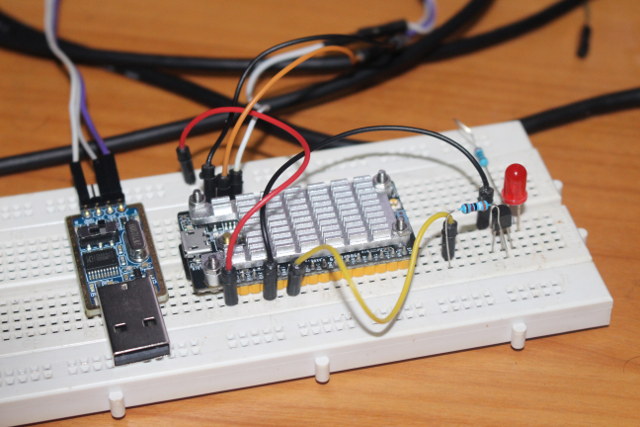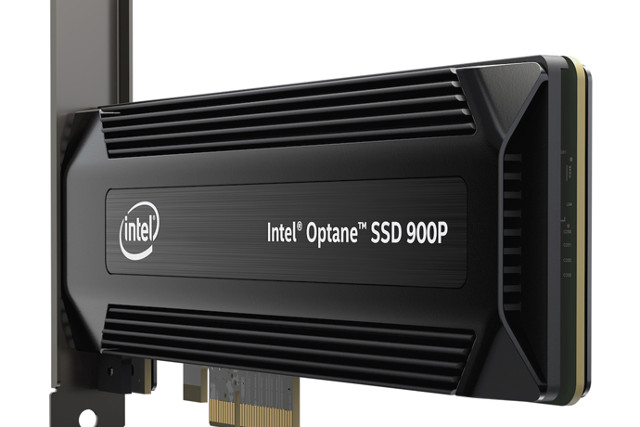I would consider purchasing a computer without SSD anymore, at least to install the operating system, and store things like email databases and web caches, since it makes a huge differences in terms of performance compared to traditional mechanical hard drives. That extra performance comes at a cost however, as SSDs have been much more expensive than HDDs, and still are, but costs have come down a lot. If you’re looking for an SSD with a fairly large capacity, Tigo S300 might be worth considering with the 480GB SSD now offered on GeekBuying for $79.99 shipped with coupon TXHIHAZC. Specifications listed for the device: Capacity – 480GB NAND Flash Type – TLC Master Controller – Marvell Interface – SATA 3 up to 6 Gbps Performance – 500MB/s read speed, 370 MB/s write speed Dimensions – 2.5″ model; 100 x 69.9 x 7 mm Weight – 50 grams 500GB HDD’s are […]
Firefly AIO-3399J All-in-One Industrial Board is Powered by Rockchip RK3399 Processor, Supports M.2 SSDs, 4G LTE Modems, and More
Firefly-RK3399 was the very first Rockchip RK3399 development board when it launched in late 2016, and it mostly stayed that way until others joined in late 2017, early 2018 with products like Orange Pi RK3399, ODROID-N1, Rock960, or Pine64 RockPro64 among others. Firefly team has now unveiled another higher end “all-in-board industrial board” with their Firefly AIO-3399J board featuring their RK3399 CoreBoard module, and a baseboard exposing plenty of I/O and connector, including support for M.2 drives, and 4G LTE mini PCIe cards. Firefly AIO-3399J specifications: SoM – RK3399 CoreBoard: SoC – Rockchip RK3399 hexa-core big.LITTLE processor with dual core ARM Cortex A72 up to 2.0 GHz and quad core Cortex A53 processor, ARM Mali-T860 MP4 GPU with OpenGL 1.1 to 3.1 support, OpenVG1.1, OpenCL and DX 11 support System Memory – 2GB or 4GB DDR3-1333 Storage – 16GB eMMC 5.1 flash (other capacities also available on demand up to […]
MINIX NEO N42C-4 Triple Display Capable Mini PC Review – Part 1: Unboxing and Teardown
MINIX NEO N42C-4 mini PC was first unveiled last September at IFA 2017, as the first Apollo Lake mini PC from the company. The device has some interesting features like the possibility to upgrade the RAM thanks to two SO-DIMM slots, and storage via an M.2 SSD slot, and support for up to three display via HDMI 1.4, mini DisplayPort 1.2, and USB type C connector. Just like MINIX NEO Z83-4 Pro model, the device is pre-loaded with an activated version of Windows 10 Pro, and includes a VESA mount. The company has now officially launched the device, with sales starting at the end of December for US$299.90 / 299.90 Euros on sites like Amazon [Update: NEO N42C-4 is now up for pre-order on GearBest]. MINIX has sent me a unit for review, so as usual, I’ll start by checking out of hardware, before testing Windows 10 Pro, system performance […]
NanoPi NEO Core and NEO Core2 Allwinner H3/H5 Systems-on-Module Launched for $7.99 and Up
FriendlyELEC has launched many cool NanoPi development boards such as NanoPi NEO2, NanoPi A64, or more recently NanoPi Duo based on Allwinner H- or A- series ARM processors, as well as some models based on Samsung/Nexcell or Amlogic SoC. The company has now launched two other NanoPi products that are a bit different since they are systems-on-module – or could even be considered minimal development boards – with namely NanoPi NEO Core powered by Allwinner H3 quad core 32-bit processor, and NanoPi NEO Core2 based on Allwinner H5 quad core 64-but processor. NanoPi NEO Core Specifications: SoC – Allwinner H3 quad core ARM Cortex-A7 processor up to 1.2GHz with Mali-400MP GPU System Memory – 256MB or 512MB DDR3 RAM Storage – NC/8GB/16GB/32GB eMMC flash, micro SD slot USB – 1x micro USB OTG port also used for power input Expansion – 2x 2.54mm pitch 24-pin headers, 1x 2.54mm pitch 20-pin […]
QNAP QBoat Sunny IoT Mini Server Board Officially Announced with Annapurna Labs AL-314 ARM Processor
We first had a glance at QNAP QBoat Sunny at CES 2017. At the time, QNAP IoT development board was powered by an Intel AnyWAN GRX750 dual core Atom based processor with 2GB RAM, 4GB flash, three Gigabit Ethernet ports, some mSATA slot and so on. The company has now officially announced the board, but with a twist, as the Intel processor has been replaced by Annapurna Labs (now part of Amazon) AL-314 quad core ARM Cortex-15 processor instead, and left most of the other features pretty much unchanged. QBoard Sunny board specifications: Processor – Annapurna Labs AL-314 quad core ARM Cortex-15 processor up to 1.7 GHz System Memory – 2GB DDR3L Storage – 512MB NAND flash, 2x M.2 2260/2280 SATA slots for SSDs (Key M) Network connectivity – 3x Gigabit Ethernet USB – 2x USB 3.1 Gen1 ports Audio – 3.5mm audio out jack, 3.5mm audio in jack Expansion […]
NanoPi Duo Quick Start Guide – Ubuntu, Breadboard, Mini Shield & mSATA SSD
As far as I know NanoPi Duo is the only quad core ARM Linux development board that can fit on a breadboard. We’ve already seen it’s much smaller than Raspberry Pi Zero, and the company offer a mini shield exposing USB ports, Ethernet, a few I/Os, and an mSATA slot in in NanoPi Duo Starter Kit Review – Part 1: Unboxing and Assembly. I’ve finally played with it this week-end, and will report what I had to do to blink a LED when connected to breadboard, and my experience using the mini shield with an mSATA SSD, WiFi connectivity, and cooling under load. Flashing Ubuntu 16.04.2 firmware image to NanoPi Duo As with many other Allwinner development boards, you should first check if Armbian is available for the board. NanoPi Duo is not supported, but it’s said to work with Orange Pi Zero image minus support for WiFi. Since the […]
Intel Optane 900P Series SSD Launched for Desktop PCs
Intel and Micron first unveiled 3D Xpoint technology (pronounced “crosspoint”) in 2015 with the promise of 1000x faster storage and 1000x better endurance than NAND flash used in SSDs. Performance was later reduced to about 7x better IOPS in a prototype, and Intel started to sell the technology under the Optane brand with the 375GB SSD DC P4800X for the enterprise market. Since then Intel entered the consumer market with 16GB and 32GB Optane M.2 cards which are meant to be used as disk cache in compatible systems thanks to their high random I/O performance, and now the company has announced the first consumer grade 3D Xpoint SSDs for desktops and work stations with Optane 900P Series available in HHHL (CEM3.0) and U.2 15mm form factors, and with random I/O performance up to four times faster than competitive NAND-based SSDs. Optane SSD 900P Series specifications: Capacity – 280 to 480 […]
CHUWI LapBook 14.1 Laptop Manufacturing Changes – Hardware at Launch vs Several Months Later
Products may evolve over time due to parts becoming phased out (EOL), so company often issues PCN (product change notices) to the company for example to replace eMMC flash that’s not manufactured anymore by a new one. They won’t change any advertised features, so the product specifications should remain the same. Reviewers normally get product from one of the first batch of production, and if you purchase the product a few months later, after carefully reading reviews, you may end up with a device slightly different. But in some cases, the company makes major changes, while still delivering the same advertised hardware specifications. That’s apparently the case for CHUWI LapBook 14.1 laptop. The photo below shows how it looked internally for the sample I reviewed. If you zoom on the photo, you’ll find an M.2 slot on the bottom of the right PCB, potentially allowing you to add an SSD […]


